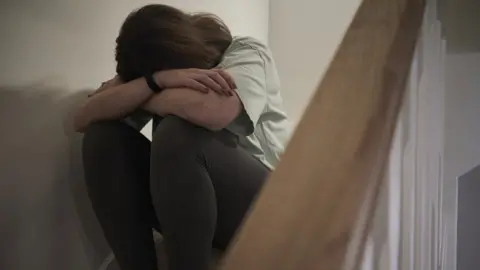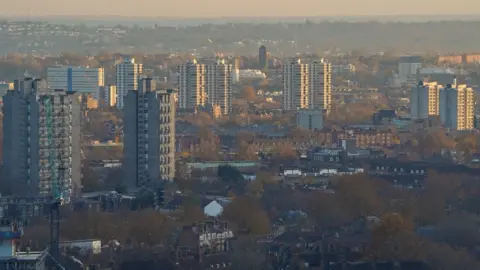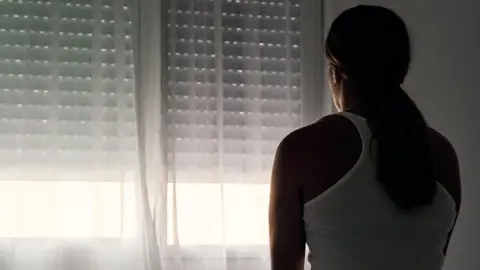Domestic violence charity staff at Hestia accused of bullying
 Getty Images
Getty ImagesA domestic violence charity is facing accusations some staff bullied and neglected vulnerable shelter residents.
The Hestia charity took over the shelter, in south London, from Refuge in November 2021 after the council put the contract out to tender.
Some women claim care at the shelter declined after Hestia took over.
Hestia says it takes the allegations "very seriously" as it investigates, and the council says "the allegations set out are concerning".
Some names have been changed to protect identities.
One woman said she had tried to take her own life after being told staff did not care about her wellbeing and feeling bullied into leaving.
Lindiwe Maqhubela arrived at the shelter during 2020 when the charity Refuge was at the helm.
She had been in a difficult situation at home and now found herself in a domestic violence shelter during the Covid pandemic.
She also received the news that her mother had passed away from Covid-19 just as the new charity Hestia was taking over.
She said: "I'd gone to the hospital to see her body. I came back to Hestia and asked if I could access the 24-hour helpline as I needed counselling, and Refuge did have that helpline that women could access.
"I was told 'no' quite curtly. I was told this was now just for emergency repairs. A couple of days later a staff member barged into my room while I was crying with grief, obviously, and handed me an eviction notice.
"She threatened to have an ambulance come and take me away if I did not stop crying." Lindiwe said that, as she understood it, she was threatened with being sectioned.
Hestia temporarily halted the eviction, but things were about to get worse for Lindiwe. "Unfortunately, my father died five days later," she added.
"I was put under unnecessary stress and harassment, while grieving and travelling to London every day to see my dying parents, and then trying to arrange their funerals."
The Office for National Statistics (ONS) found that in mid-May 2020, there was a 12% increase in the number of domestic abuse cases referred to victim support.
Between April and June 2020, there was a 65% increase in calls to the National Domestic Abuse Helpline, when compared to the first three months of that year.
Women can stay as long as necessary in a refuge, but most move on within months. During and immediately after the pandemic, this was not so easy.
 Reuters
ReutersAnother survivor, Stephanie, stayed at the same the shelter earlier this year. She was with her young child, escaping violence at home.
She said: "It's a refuge, so no men are allowed. I heard a man's voice in the night. I was really scared, there was a loud argument.
"I called my case worker out of fear, I called and texted but no one answered. I felt it wasn't taken seriously.
"Another lady had an argument with her partner. The police were called and again we were not informed of what was happening even though we were living there.
"I decided to leave and go and stay with a relative."
Stephanie says she and her child had been gone for three weeks before there was any contact from the shelter.
'Blood on hands'
Women pay rent to stay at the shelter and a service charge. For this, they are given a room and share a bathroom and kitchen. The rent often comes out of housing benefit, and clients do not usually have to pay any money up front.
Stephanie says she was suddenly given notice that she was £2,000 in arrears with her rent even though she had been assured the charity would sort her benefits out. Otherwise homeless, she said she felt "terrified".
Aisha was at the same shelter for six months with her child in 2022. She said: "Even when there was an emergency they didn't answer.
"We have come from abuse and we are depressed. When I left, no one helped me, they just let me go. They were glad to see me go. It is a business."
 Getty Images
Getty ImagesLindiwe was under threat of eviction again. She says she overheard a senior employee telling her new caseworker, "if she kills herself over the eviction, she kills herself".
The pressure was too much for her mental health and, a few days later, she attempted to take her own life. She was found just in time by her new caseworker, Miriam.
"What they did was look at Lindiwe as an opponent," she said. "We should all realise that it is miracle that we hear Lindiwe's voice today because I walked in on her attempting suicide. And it would be blood on Hestia's hands."
After months off sick with stress, Miriam left the charity. She is now working for a different organisation. Lindiwe has since found somewhere permanent to live.
'Concerning allegations'
Patrick Ryan, chief executive of Hestia, said: "The safety and wellbeing of the women we support is our most important priority and we take allegations of behaviour that falls below our high standards very seriously.
"Our refuges are designed to be places of empowerment, sanctuary, and hope for some of the most vulnerable in society and we take the experience described by our former client Lindiwe seriously and would welcome a conversation with her.
"Meanwhile, we are investigating what she has said, and are working closely with our staff and independent, third-party partners to establish the facts which will enable us to take any further action."
A spokesperson for the local authority said: "The council is committed to tackling domestic abuse and ensuring the needs of victims and survivors are met through the provision of our commissioned services.
"The allegations set out are concerning. The council has requested Hestia conduct a full investigation into these allegations and share the findings with us, following which we will take the appropriate steps.
"The council will also take steps to offer a confidential route for current service users to raise any concerns."

Follow BBC London on Facebook, Twitter and Instagram. Send your story ideas to [email protected]
